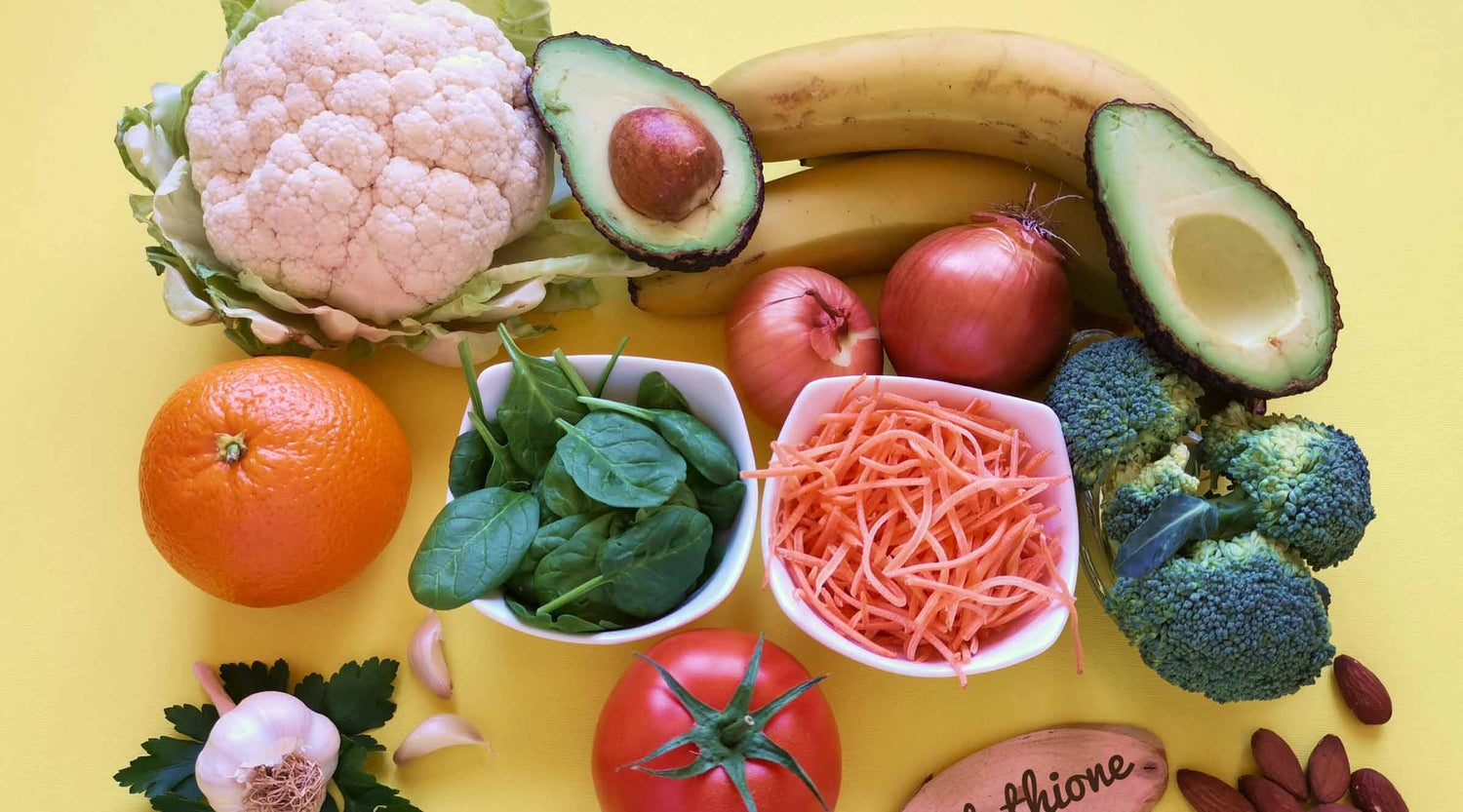The natural sources and benefits of glutathione
It’s no secret that we’re big fans of foods that are rich in antioxidants. They play a crucial role in protecting our cells, DNA and proteins from free radicals and the oxidative damage they can cause. But did you know that one of the most powerful antioxidants is made by our cells themselves? It’s called Glutathione, and while it is also found in natural foods, it’s most beneficial to us when we make it.
Glutathione is known as an “endogenous” antioxidant because it is one of several that are made within the body. Made in the liver, it is the tripeptide product made from the amino acids glycine, cysteine, and glutamic acid.
Like melatonin, collagen, and so many other beneficial compounds, our bodies produce less glutathione as we age. A deficiency in the production of glutathione can affect the health of our cells, immune system and brain while making us less efficient at removing toxins.
This is one reason supplements are so sought-after, but in the case of this particular antioxidant, it’s a little more complicated. It turns out that it may be more effective to support the body’s production of glutathione than to seek it out fully formed in foods and supplements. Read on for more on that topic.
What are the benefits of glutathione?
Glutathione, sometimes called the "master antioxidant," is a naturally occurring substance found in virtually every cell of the human body. The cellular concentration of glutathione can be as high as potassium and glucose, which is a good indication that it plays an important role in our metabolism.
Like all antioxidants, glutathione’s primary strength is combating oxidative stress and thus protecting our cells from damage that can lead to disease. Other potential benefits include boosting the immune system, detoxifying the body, and fighting the effects of aging.
Reducing oxidative stress
Glutathione does what an antioxidant should: neutralize free radicals that are released by chemical reactions in the body. Within that arena, it has shown to have particular strengths when it comes to protecting the cell’s vital components, such as mitochondria and the telomeres that hold our DNA together. It also plays a role in the repair of DNA and proteins.
Detoxification
Between environmental pollutants and the chemicals in the foods we consume, the liver has a big job in removing the toxins from our bodies, which is why it needs a strong and efficient detoxifying agent. Glutathione binds to toxins, including persistent organic pollutants (POPs) and heavy metals like mercury in order to shuttle them out of the body. If we lack a sufficient level of glutathione, the liver will have to work harder and be less effective in its primary duty of keeping our system clean.
Auto-immune support
The detoxifying action of glutathione contributes directly to the cleansing of the small intestine, which enables us to efficiently absorb nutrients, vitamins and minerals from food. A healthy digestive system helps power our immune response and prevent excess inflammation that can lead to autoimmune issues and chronic conditions.
In addition, glutathione can increase the production and effectiveness of disease-fighting lymphocytes, such as T cells, B cells and natural killer cells.
So if we produce less glutathione as we age, what can we do to get or make as much as we can?
The best natural sources of glutathione.
There are many plant-based foods that contain glutathione. Asparagus and avocado top the list of foods with the highest concentrations, followed by spinach, okra and broccoli, as well as cantaloupe, tomatoes, carrots and various citrus fruits. Cooked, pasteurized and processed foods can lose most or all of the glutathione they naturally contain.
While all of these miraculous foods give us so many beneficial nutrients, we don’t need to spend much time discussing the amount of glutathione they contain, because we can only absorb and use a small amount of it.
The average healthy human has about 10 grams of glutathione circulating in their body tissues at any given time. Less than 1.5% of that amount comes from dietary sources, which is still of value since the intestinal cells do absorb some and get the detoxifying benefits of glutathione.
The main obstacle to increasing glutathione through food or supplements is the digestive system itself. Protein digesting enzymes in the stomach begin dissolving the bonds of the tripeptide molecule and the intestines can only absorb so much of what makes it through, even on a good gut day. So let’s focus on ways to boost our body’s very own antioxidant.
Increasing glutathione levels in the body.
When it comes to increasing glutathione concentration, it appears that the indirect route is the most effective. Consuming foods that are rich in the compound is not necessarily the most efficient way to get it into your system. A better approach is to consistently eat glutathione supportive foods. Here are a few of the most effective.
Cruciferous vegetables
It’s not very often we hear sulfur promoted as a key nutrient, but it is an important building block of glutathione. Vegetables like broccoli, cauliflower, Brussels sprouts, kale, watercress, turnips and bok choy are good sources of sulfur.
Herbs and spices
Milk thistle is one herb whose active compound, silymarin, helps to detoxify, protect and prevent glutathione depletion in the liver. There are studies that suggest curcumin, turmeric and other herbs found in curry also assist in glutathione synthesis.
Exercise
Another way to get your body to produce more antioxidants is to give it a reason. One side effect of exercise is the production of free radicals as the result of the chemical reactions that occur as a function of muscle growth. So, naturally, your body responds by making more glutathione to meet the level of the new threat.
High-dose intravenous glutathione delivery
An IV may not be our first choice in boosting the glutathione level in our body, but it has shown to be effective in bypassing the digestive system and getting right into the bloodstream in large amounts to address specific conditions. Favorable results have been observed in treating “fatty liver” disease, cystic fibrosis, AIDS-related weight loss and peripheral artery disease, in which plaque build-up in the legs makes walking painful and difficult.
Glutathione-boosting supplements are a non-invasive and easily accessible alternative to the intravenous glutathione delivery. To maximize your body’s glutathione levels, we recommend choosing supplements containing selenium and n-acetyl cysteine, like the Glutathione Promoter with Selenium. Supplying your body with selenium and n-acetyl cysteine helps boost your body’s natural production of glutathione. In addition to playing an important role in glutathione production, selenium has also been shown to support healthy immunity.
It’s nice to know that we are designed to create what we need to overcome the health challenges that are thrown at us throughout our lives, from disease to infection to environmental pollutants. As we get older, it’s important that we not only include foods that contain glutathione, but also foods that contain the precursor amino acids that support our body’s production of it. Along with exercise and adequate sleep, glutathione is a powerful ally in protecting ourselves and feeling our best.






